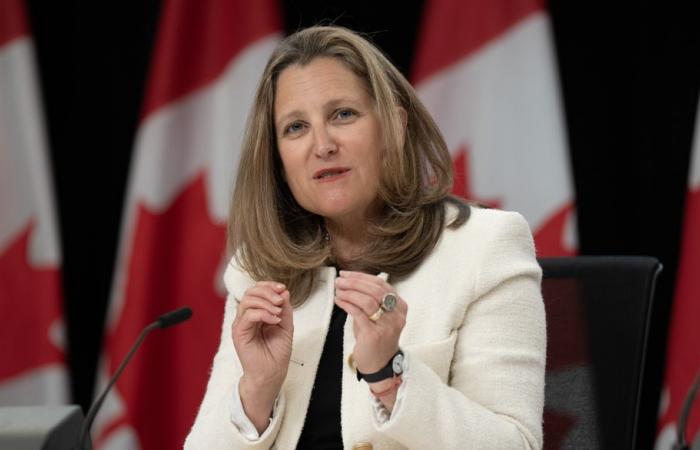In the handkerchief category, Chrystia Freeland’s statement on capital gain deserves an honorable mention.
Posted at 1:53 a.m.
Updated at 6:00 a.m.
“What kind of Canada do you want to live in?” In a country where children go to school on empty stomachs? In a country where a teenager gets pregnant simply because she doesn’t have the money to pay for contraceptives? »
Few people will answer yes, obviously.
The Minister of Finance is not wrong to emphasize that the redistribution of wealth is essential to ensure human dignity.
But would these services really be threatened, as she suggests, if the sale of a chalet, a plex, stock market shares and other capital gains were not taxed more? If true, it would prove the sad state of our public finances. And therefore, the failure of the Liberal government.
Before analyzing the relevance of the measure itself, we must talk about the political strategy.
The trap is flashing red: the Liberals want to show that the Conservative Party does not defend people with modest incomes.
Their leader Pierre Poilievre refuses the labels of left and right. He claims to speak on behalf of the middle class and wants to build a coalition of voters by banking on both fiscal conservatives and the more blue-collar electorate in the suburbs and rural regions. He even hunts in New Democratic territory.
For progressives, this is heresy. They do not understand how a person with a modest income can support a party that funds little social programs. We wonder if citizens are poorly informed. If they show their rejection of the intellectual or bureaucratic elites who benefit from this interventionist state. Or, if they are motivated by a discourse of identity – which does not apply to Canada, where multiculturalism is celebrated by all federalist parties.
PHOTO ADRIAN WYLD, CANADIAN PRESS ARCHIVES
Chrystia Freeland, Minister of Finance of Canada
On the right, we mock these theories. Poorly-affluent voters can clearly prefer the Conservatives. They tolerate inequalities because they believe they reward effort and hope that one day it will be their turn. They can also uphold respect for traditions and law and order.
To replenish this electorate, Mr. Poilievre surprised by supporting the anti-scab bill, presented by the Liberals after years of being pressured by the Bloc and the New Democrats.
But the increase in capital gains tax was too much for the Conservative leader.
“Ah! Ha! », shout the liberals. In their eyes, Mr. Poilievre would thus reveal that he does not care about the fate of the “ordinary world”. He is opposed to this measure which would only affect 0.13% of taxpayers per year.
In fact, the Conservative leader is mainly defending the rich here. Although the full version is a little more complicated…
The capital gains ruling is not entirely a surprise.
Before entering politics, Mme Freeland denounced inequality in an essay on “plutocrats.”
When the Liberals came to power, they created an income allowance to reduce child poverty and reduced taxes for incomes between $45,000 and $90,000. In return, they increased the tax on income above $200,000.
The idea of taxing capital gains more has been circulating in Ottawa for a long time. But in the last budget, she made a surprise appearance. It seemed more like a last-minute maneuver.
Mme Freeland was looking for revenue to keep his promise to keep the deficit below $40 billion.
The capital inclusion rate thus returns to the level observed between 1987 and 2000. But at the time, taxpayers were given advance notice. Same thing for the previous reform in 1972. This time, the sudden approach did not give taxpayers and businesses time to adjust.
Which brings us back to the Minister of Finance’s statement. If her budget plan is based on this measure, it proves that she was incapable of financing the concessions made to the NDP to stay in power, such as the first step towards a national public drug insurance plan imposed on the provinces.
With this increase in capital gains tax, it plans to rake in 19 billion over five years. Businesses will pay a little more than half (10.6 billion). But a tax break was offered to small entrepreneurs.
Mme Freeland recalls that only 0.13% of taxpayers will be affected. In fact, it’s an annual percentage. More people will be affected during their lifetime – you usually only sell an asset like a triplex once.
That said, the impact on the middle class has been exaggerated. Let’s take the example of a couple whose retirement depends on their triplex. He occupies one floor of his triplex. If he bought it and resold it for 1 million, he will not be affected by the increase 1.
Several experts agreed with the reduction of the privilege granted to capital gains 2.
Besides, Mr. Poilievre is not promising to eliminate it… Since he is committed to balancing the budget, he might need this income.
However, a Conservative government would set up a committee to review taxation. In principle, the idea is good. Tax measures must routinely be cleaned up, especially those that fatten large businesses without improving their productivity.
But in this exercise, Mr. Poilievre will have to reveal his vision. Who will he want to benefit? His “common sense” will soon have to reveal its true colors.
Capital gain in brief
Capital gain is the profit pocketed by a company or a citizen upon the sale of an asset (stock market share, income property, chalet, etc.). The main residence is not affected.
Currently, we only pay tax on half of this profit. The usual tax grid applies. The other half is not taxable. The profit is therefore 50% exempt from tax.
For example, if you buy a cottage for $300,000 and sell it for $500,000, your profit is $200,000. You are only taxed on half of this profit, $100,000.
This is a generous benefit. This exemption was supposed to promote risk-taking and protect taxpayers from inflation. It also served as a substitute for the inheritance tax after a death.
Starting next week, the federal government will increase the inclusion rate. For a profit between $1 and $250,000, nothing changes. For a profit over $250,000, tax will be paid on 66.67% of the amount.
In other words, the privilege remains, but it is diminishing.
1. The example is borrowed from Luc Godbout, holder of the Research Chair in Taxation and Public Finance, University of Sherbrooke.
2. Read the text “Rethinking capital gains taxation”







